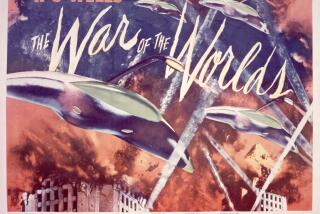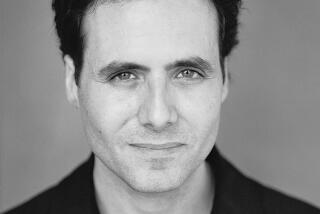A Thrilling Novel of Ideas--About Science, No Less
- Share via
Richard N. Goodwin’s “The Hinge of the World” is a rare accomplishment, a book of ideas that manages to be animated, suspenseful and firmly grounded in the individual psychological identities of its principal characters. The ideas under discussion here--about scientific method and the threat it posed to Catholicism during the first decades of the 17th century--feel as fresh and as startling as when they were first formulated. They receive an elegant and downright thrilling articulation by Goodwin, who served in the Kennedy and Johnson administrations and went on to write widely about America in the 1960s.
While Italy in the 1620s and America in the 1960s would seem to have little in common, both in fact were periods of social and intellectual upheaval; both were periods in which figures of great charisma and conviction entered public life; and both were periods in which the world was significantly changed by the power of ideas.
Written as a drama, “The Hinge of the World” displays many characteristics of a philosophical dialogue, a genre much in favor in ancient Greece and during the Renaissance. Yet Goodwin is careful throughout to give his speakers flesh and blood and foibles, and it is not impossible to imagine his work being presented on the stage. The principal speakers are the Tuscan scientist Galileo Galilei and Maffeo Cardinal Barberini, who is the Vatican’s ambassador to France when we first meet him and is Pope Urban VIII by the end of the story.
At first intellectually compatible, the proud, fame-seeking, rigorously curious, defiant and in some ways naive Galileo and the ambitious and willful Urban VIII come to embody two fiercely distinct worldviews. In the eyes of history, of course, Galileo will prevail, as even Goodwin’s intricately drawn Urban VIII seems to understand; but along the way there is much thorny and dramatic tangling between the two protagonists and their followers.
Goodwin launches his drama by taking us directly into the laboratory of scientific history. Here we find Galileo disproving Aristotle by showing that objects of different weights fall at the same rate. Next he demonstrates the principle of inertia. Yet the specifics of these and other experiments that follow are of less consequence than the thinking behind them. As Galileo says, “We must forget what we know. It blunts our power to reason.” The most remarkable of all Galileo’s inventions is just this, the way he forgets what he knows, and instead develops a theory to explain the behavior of nature, constructs experiments and instruments to test his theory, and in time uncovers nature’s mathematical laws.
Galileo’s scientific ideology was, as Goodwin points out in one of several helpful side notes, “far more important than any of his discoveries through the telescope”--though these soon follow and bring Galileo to the attention of the Venetian Republic, whose senators recognize the telescope’s use as a weapon (approaching enemies can be more quickly detected); the Florentine Republic, whose ruling duke wishes to reclaim a brilliant native son; and the church, which is profoundly disturbed by the possibility that Galileo will be able to prove the accuracy of Copernicus’ idea that the sun, not the Earth, is the center of the solar system--an idea that dangerously contradicts the authority of the Bible.
*
Throughout, Galileo retains his own belief. Even after (working through a loophole) he acquires the church’s imprimatur and publishes his own dialogue, which is a debate between the followers of Aristotle and those of Copernicus, he still maintains that “[a]ll my labors, my life, [have been] solely purposed to understand His world, unfold the glory of His works, unveil the enormity of His wonders.” To this, Urban VIII thunders, “Understand God! Glorify God! Demonstrate God! You?” As the pope sees it, Galileo has unleashed “a new faith”--a way of thinking freely--that “allows all men to believe themselves masters of Creation.” The repercussions are grave. He submits Galileo to the Inquisition. In his old age, Galileo is banished into exile and prohibited from publishing.
“The Hinge of the World” is history alive with tension, passion and paradox. Urban VIII is not only thunderous, he very humanly regrets the loss of his friend, just as Galileo regrets being tricked into a discussion of Scripture. Galileo also regrets having sacrificed his daughter’s life to his career; he even--in frustration--actually breaks his pen and (briefly) regrets having written his book. But the wiser, the prevailing Galileo is the man who observes: “What an invention! The greatest in the story of our world; this writing. By a few simple symbols . . . to send one’s thoughts over vast intervals of space . . . across time . . . to let the dead speak.” So Goodwin has Galileo marveling at his work; with these same words, we may marvel at Goodwin’s.
More to Read
Sign up for our Book Club newsletter
Get the latest news, events and more from the Los Angeles Times Book Club, and help us get L.A. reading and talking.
You may occasionally receive promotional content from the Los Angeles Times.








